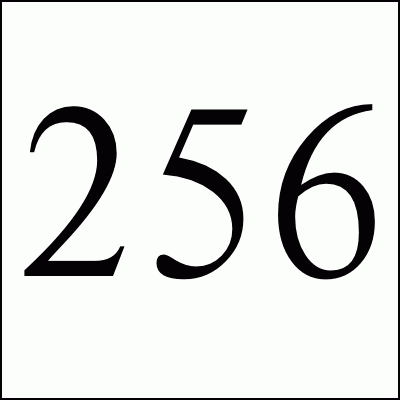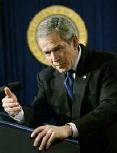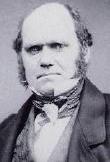

So Bush and other prominent conservatives are pushing "Intelligent Design" as an alternative to evolution. Basically the dogma is that we did not evolve from lesser life forms but that god made us in six 24-hour days and then took a day off, like it says in the bible. I disagree with this view on a couple of different levels that I'd like to expound on.
I should first start off with saying that I'm a biblical skeptic. I'm sure that there are sections of the bible, maybe large sections, which are factually and historically accurate, but that much of the document was passed down by the devout over generations before being written and then translated a few dozen times leaving the "word of god" heavily influenced by the "hand of man" with all of the linguistic, social, and political overtones. Theologians in each religion continue to debate the meaning of passages let alone the debates that happen between the different religions which view the Old Testament to be holy. Those of you who had read the bible must have noticed that was written by many individuals with vastly different tones and language. It is not a consistent document -- even in its heavily altered state.

But regardless of the authenticity of this document, I do not see it as precluding evolution. Before we go any further we should define evolution since I hear that many people who argue against its teaching don't fully understand the theory. Wikipedia defines evolution as:
[...] a process by which organisms acquire and pass on novel traits from generation to generation. [...] With the publication of Charles Darwin (pictured at right) and Alfred Russel Wallace's joint paper in 1858 followed by Darwin's book Origin of Species in 1859, the theory of evolution by natural selection became firmly established within the scientific community.
Natural section is in turn defined as:
Natural selection is a process by which biological populations are altered over time, as a result of the propagation of heritable traits that affect the capacity of individual organisms to survive and reproduce.
If I may be so bold to summarize evolution and natural-selection, it is that variation in our genetic makeup combined with the genetic combination which happens during mating results in the species changing over thousands and millions of years. Each of us is genetically different with even identical twins sporting variations in genetic expression. When we have children, the genes from each parent are combined to produce a genetical different child. What happens to us during our lives and our choice of mates impacts the range of traits our children possess and, ultimately influence the human race.
If a newborn gazelle cannot get up and start running with his mother within a couple of minutes, it runs a high risk of being killed. This is the essence of natural selection. That the forces of nature will kill those individuals not strong enough to overcome them. These forces select the strong individuals who grow into adults and who have the opportunity to mate -- having a higher likely hood of passing on the strong genes to their children which over time makes the species stronger. Natural selection also encourages species to be better able to capture food, to stay healthy, or to have brighter tail feathers to attract the female.
Humans have long achieved the next phase in our evolution where we are [somewhat] masters of our environment. The lion is not nearby in the delivery room to cull the human herd. Babies born prematurely now have a much higher chance of surviving to adulthood than even 10 years ago. We can surgically repair many fetal defects by surgery even before the baby is born. All of these factors indicate that natural selection has been slowed but it will never be removed.
At the very least, we still choose our mates, implying that certain physical characteristics, health, and personality genes are still under evolution pressure. If you look at 100,000 people, you could see that the healthier and more successful individuals are more likely to find a mate -- are more likely to reproduce. It's those statistical differences over large groups of people which selects for certain traits. You might say that it is hard to find genes for success, but I would argue that even personality traits that one might think of as environmentally produced would most likely have genetic components: drive, enthusiasm, education, work ethic, interpersonal skills.
So one of the things that worries be about the "Intelligent Design" movement is that it is an example of religion and associated political leaders trying to dictate educational and scientific thought. People's beliefs, with little to no evidence in support, are impacting how children are being taught in this country. We are falling behind the rest of the world in our production of scientists and engineers and we are letting dogma overcome that which is considered, by most of the rest of the world, widely adopted scientific theory. Correlation? No one is stopping parents from teaching their children at home about religion but for some reason they want to thrust their views on others. Changing of biology programs and texts through social movement is not the way it's supposed to happen.
Now to be fair, there is no "truth" in science. There are hypothesis and evidence. You can disprove an alternate hypothesis but you can rarely prove something outside of the discrete fields like mathematics. Scientists are always struggling to get to the bottom of their tenants. When a theory is widely adopted it has been recognized by experts and international bodies as having sound supporting evidence and weak or non-existing contrary evidence. Science doesn't always work well especially given that it is practiced by human beings with their politics, funding dilemmas, and egos, but you have to give science credit for constantly self-analyzing and challenging itself. It is considered very bad science when a researcher believes something is true and goes out to prove it. They tend to dismiss contrary data and overlook alternatives.
Contrast this with religious beliefs. The very definition of god removes the ability for observation and testing of the basic tenants of religion. I can believe in one god and you another and there is no good framework for us to compare the truth between our deities. There is certainly historical evidence that supports some religious texts but little to none of it would hold very well to alternative meaning arguments. And it shouldn't have to. Religion is trying to provide us with answers to the unanswerable questions. It is trying to give us greater meaning to our lives which may otherwise be very limited. It is giving us a framework to explain the vastness of our universe and imagination. Although we can attempt to reconcile religion and science, they are mostly incompatible.
But what confuses me most about the evolution versus "intelligent design" debate is that I see few contradictions between them. Is it really hard to believe that some god put this universe into motion a trillion years ago? Does the bible really preclude the idea that evolution was part of god's plan -- that s/he created the energy and matter at the very beginning of our universe with the idea to watch and see what intelligences reared their heads above the chaos? "Intelligent Design" sounds to me to be the crib notes of life. It suffers from a lack of imagination -- a limiting of what should be unlimited time and space all possibly under an infinite intelligence.

As I see it, if early man was visited by creatures on wing spouting the word of god, they were most likely poorly equiped to properly deal with the information. The world at the time was believed to be small and flat, and concepts like galaxies and our place in the universe were not at all understood. Maybe the devout that heard and transcribed the word of god just couldn't understand it fully or details were lost in translation. For example, there is much debate about the use of the word yom in the early Hebrew texts which has been translated into day meaning 24-hour periods. Maybe the concept of infinite time was outside of the capacity of the early man crouching in front of the angel or burning bush. Maybe god made all of our universe in 7 nanoseconds. Maybe he was a little busy creating an infinite number of other universes and took 7 millennium. Maybe our puny little brains can't understand the length of time it took the powers that be to create the universe. Maybe god can move through time like we can a slow moving river and that linear time is such a quaint concept to the almighty.
Religious pundits brush off scientific evidence of millions of years of earth history and astronomical knowledge as "tests of faith". I think it is at least as likely that the bible is a test of faith -- that Christians must fine the nuggets of the word of god in the midst of a book mostly about the opinion of man. So much of our modern religious texts and thought has been created by men in a time when the religious institutions were the power brokers of the world having domain over all governments, wealth, and knowledge. Maybe the test of faith is in the rejection of the religious institutions born of man.
Either chaos or some intelligent power has put extensive evidence that supports theories of the foundation of our universe: eons of tectonic formation, ancient fossil records, redshifted light from distant and ancient galaxies, and evolution of the species. Maybe they are tests of faith but which way? Is it our challenge to believe in the wonders of the universe -- of infinite time and space -- or is it to treat them as an illusion designed to confuse us? Is it god who is asking us to refute the evidence of our own insignificance or is it the human religious power-brokers who controlled the religious texts and belief systems for millennia?
So here is what I believe -- my faith. I believe that there may be a purpose to the universe, the galaxy, the solar system, earth, and my consciousness although I recognize that I many never understand it or even know it. I am willing to entertain the thought that there is intelligence at work -- a great design -- as an alternative hypothesis that I will never be able to disprove. I have respect for the religious who work towards greater understanding of our universe through faith, even as I doubt and often disagree. But I have little patience with the people who think that their beliefs, without scientific evidence or merit, should dictate political, social, and scientific thought and education.
I believe the extensive, fundamental scientific knowledge which indicates that our world and the universe is at least billions of years old. That man evolved initially from simple lifeforms in the seas, to amphibians, early mammals, apes, Neanderthals, and then homo sapiens. That over the millennia, evolution and natural selection has exposed and weeded out defects in the species to improve our survival and overall efficacy.
Perhaps Galileo said it best:
I do not feel obliged to believe that the same God who has endowed us with sense, reason, and intellect has intended us to forgo their use.
Free Spam Protection Android ORM Simple Java Zip JMX using HTTP Great Eggnog Recipe Eero Model Comparison